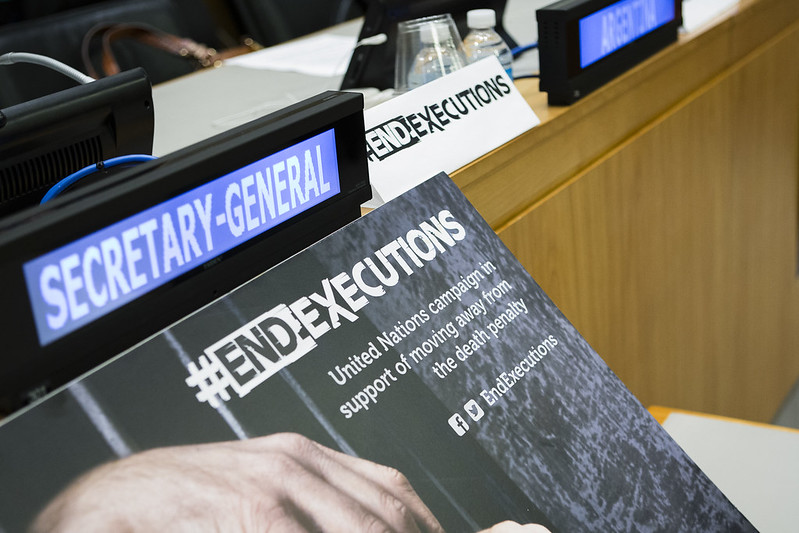
By Manik Mehta
NEW YORK, Aug 9 – The Office of the Human Rights High Commissioner of The United Nations and human rights organizations and activists around the world have expressed shock and concern over the
executions last Friday (Aug.5) of two more persons on drug-trafficking charges in Singapore.
Defying last-minute appeals made by human rights activists around the world and the UN
Human Rights Commissioner in Geneva, Singapore carried out the executions of Abdul Rahim
bin Shapiee and Ong Seow Ping on Friday.
News about the two executions on Friday – most human rights did not expect any clemency
from Singapore, given the island-state’s record of executions and human rights’ violations, –
was confirmed by the family members of the executed prisoners, bringing the total number of
people executed to 10 since March.
Human rights experts in New York privately told Weekly Echo that the “unprecedented pace” in carrying out the executions by Singapore has drawn fierce criticism from the UN and other human rights organizations which have called for an immediate halt to executions.
Human rights organization stated that Rahim had even tried on Thursday to get the execution
postponed, and even attended a video call hearing after a complaint was filed by him and 28
other prisoners on death row, against the Singaporean government and the Attorney General’s
office.
Representing their own cases, the prisoners and anti-death penalty campaigners, had argued
that Singapore had denied them access to justice, as fees levied on lawyers defending death
row inmates in the latter parts of the process were so high that they were discouraged from
getting involved.
The court rejected the petition after deliberating until early Friday morning, dismissing it as an
“abuse” of the process. According to Kirsten Han, coordinator of the NGO Transformative
Justice Collective, Rahim was given an hour with his family before being hanged.
There is widespread concern among many human rights campaigners – and also at the United
Nations Human Rights Council – not only over the executions but also at the sequential pace at
which they are being carried out.
The executions in Singapore have also proved to be a setback for those who believed that there was a declining trend in executions worldwide. Singapore has one of the world’s most draconian anti-drug laws, with death sentence imposed for those trafficking more than 15 grams of heroin, 30 grams of cocaine, 500 grams of cannabis or 250 grams of methamphetamine.
Since the end of March, Singapore has carried out 10 executions for drug trafficking, with
activists warning that there are still more than 50 on death row.
UN human rights experts have also claimed – this was also expressed in a recently released statement from the the UN Human Rights Commissioner’s office – that minorities in Singapore are disproportionately sentenced to the death penalty, as has been the case in the past executions carried out in Singapore.
The eight people hanged so far this year, prior to the Aug 5 executions, were all from an ethnic
minority background or were Malaysian nationals, the statement said.
Last week, Nazeri Bin Lajim was executed after having been apprehended in April 2012 on charges of trafficking diamorphine. “Under international law, States that have not yet abolished the death penalty may only impose it for the ‘most serious crimes’, involving intentional killing,” UN and other independent
experts have said. “Drug offences clearly do not meet this threshold.”
In a statement issued earlier, Liz Throssell, the spokesperson of the UN Human Rights Office, said “we deplore the hanging today (2 Aug.) of two men in Singapore and are deeply troubled by the
planned execution of two others on 5 August”.
The UNHR office has condemned the death penalty as inconsistent with the right to life and
to be free from torture or cruel, inhuman or degrading treatment or punishment. UN experts
maintain there was a growing consensus for its universal abolition.
It has called on the government of Singapore to end the use of mandatory death sentences for
drug offences, commute all death sentences to a sentence of imprisonment and immediately
put in place a moratorium on all executions, with a view to abolishing the death penalty.
Lawyers and activists have pointed out that those executed are mostly from poor families, hired
as mules by drug kingpins who have largely escaped arrest, an argument that Singapore courts
have rejected.
Amnesty International and other human rights organizations have sharply condemned
Singapore’s rising number of executions, saying that Singapore’s executions on drug-related
offenses went against international human rights laws and standards.
“Rather than having a unique deterrent effect on crime, these executions only show the utter
disregard the Singaporean authorities have for human rights and the right to life,” Amnesty’s
expert on the death penalty, Chiara Sangorgio, said.
Throssell had called on the Singaporean Government to “end the use of mandatory death
sentences for drug offences, commute all death sentences to a sentence of imprisonment and
immediately put in place a moratorium on all executions, with a view to abolishing the death
penalty”.
Over 170 States have, so far, abolished or introduced a moratorium on the death penalty either
in law or in practice and the UN urges Singapore to follow in their footsteps.
— WE